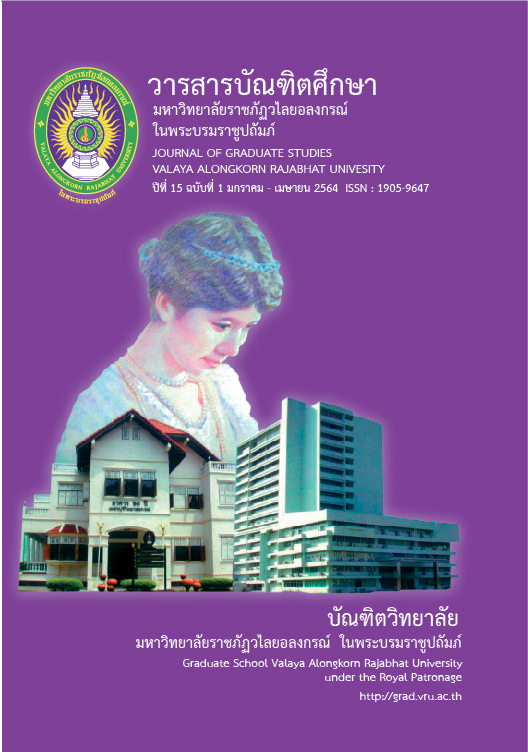SERVANT LEADERSHIP, WORKPLACE SPIRITUALITY AND INNOVATIVE WORK BEHAVIOR OF MANAGERS IN PRIVATE SECTOR
Main Article Content
Abstract
The objectives of this research were to: 1) study the comparison of innovative work behavior of different personal factors, 2) study the relationship between servant leadership, workplace spirituality and innovative work behavior, and 3) study the effect of between servant leadership, workplace spirituality and innovative work behavior. The sample of this research was 400 managers in private sector in Bangkok Metropolitan Region by convenience sampling.
The results of the research had showed the following: 1) In difference personal factors, sex and work experience had significant level on innovative work behavior at .05 and .01 respectively but age and level of education were not statistically significant difference level on innovative work behavior. 2) Servant leadership and workplace spirituality had significant positive relationships with innovative work behavior of managers in private sector at .01 and 3) servant leadership and workplace spirituality could significantly predict innovative work behavior of managers in private sector at the .01 level.
Article Details

This work is licensed under a Creative Commons Attribution-NonCommercial-NoDerivatives 4.0 International License.
บทความทุกเรื่องได้รับการตรวจความถูกต้องทางวิชาการโดยผู้ทรงคุณวุฒิ ทรรศนะและข้อคิดเห็นในบทความ Journal of Global of Perspectives in Humanities and Social Sciences (J-GPHSS) มิใช่เป็นทรรศนะและความคิดของผู้จัดทำจึงมิใช่ความรับผิดชอบของบัณฑิตวิทยาลัย มหาวิทยาลัยราชภัฏวไลยอลงกรณ์ ในพระบรมราชูปถัมภ์ กองบรรณาธิการไม่สงวนสิทธิ์การคัดลอก แต่ให้อ้างอิงแหล่งที่มา
References
Afsar, B., & Rehman, M. (2015). The relationship between workplace spirituality and innovative work behavior: the mediating role of perceived person–organization fit. Journal of Management, Spirituality & Religion. 12(4), 329-353.
Afsar, B., & Badir, Y. (2017). Workplace spirituality, perceived organizational support and innovative work behavior: The mediating effects of person-organization fit. Journal of Workplace Learning. 29(2), 95-109.
Carmeli, A., Meitar, R., & Weisberg, J. (2006). Self-leadership skills and innovative behavior at work. International Journal of Manpower. 27(1), 75-90.
Chongvisal, R. (2016). phāwa phū nam : thritsadī kānwičhai læ nǣothāng sū kānphatthanā [Leadership: theories,research,and approaches to development]. 3rd ed. Bangkok: Chulalongkorn University Printing House.
Chongvisal R. (2018). čhittawitthayā ʻongkān [Organizational Psychology]. 3rd ed. Bangkok: Chulalongkorn University Printing House.
Dierendonck, D., & Patterson, K. (2010). Servant Leadership Developments in Theory and Research. United Kingdom: Palgrave Macmillan.
Ekakun, T. (2007). rabīap withī wičhai thāng phrưttikam sāt læ sangkhommasāt [Research methodology in behavioral sciences and social sciences]. 5th ed. Ubon Ratchathani: Witthaya Offset Printing House.
Faraz, N. A., Mughal, M. F., Ahmed, F., Raza, A., & Iqbal, M. K. (2019). The Impact of servant leadership on employees’ innovative work behaviour-mediating role of psychological empowerment. International Journal of Management Science and Business Administration. 5(3), 10-21.
Jong, J., & Hartog, D. (2010). Measuring innovative work behavior. Creativity and Innovation Management. 19(1), 23-35.
Jumpadee N. (2011). kānraprū khwāmsāmāt khō̜ng tonʻēng rūpbǣp khwāmkhit sāngsan læ patčhai sūan bukkhon thī mī tō̜ phrưttikamkān sāngsan nawattakam kō̜ranī sưksā bō̜risat phū hai kham prưksā læ phatthanā rabop khō̜mphiutœ̄ hǣng nưng [Effect of self-efficacy, creative style and individual factor to innovative work behavior: A case study of a Software House]. Degree of Master of Art. Thammasat University, Bangkok.
Kinjerski, V., & Skrypnek, B. J. (2006). A Human Ecological Model of Spirit at Work. Journal of Management, Spirituality & Religion. 3(3), 231-241.
Kitreerautiwong, N., & Tetjativaddhana, P. (2013). khwām trong læ khwāmchư̄aman khō̜ng bǣpsō̜pthām pramœ̄n prasopkān kāndūlǣ tō̜nư̄ang samrap phūpūai baowān chanit thī sō̜ng chabap phāsā Thai [Validity and Reliability of the Thai Version of the Experienced Continuity of Care for Diabetes Mellitus (ECC-DM) Questionnaire]. The Public Health Journal of Burapha University. 8(1), 13-25.
Kusumawalee S. (2015). sētthakit chœ̄ng sāngsan [Creative Economy]. Bangkok: Chulalongkorn University Printing House.
Meitar, R., & Weisberg, J. (2006). Self-leadership skills and innovative behavior at work. International Journal of Manpower. 27(1), 75-90.
Phuangprayong, K. (2018). botbāt khō̜ng sētthakit sāngsan læ phrưttikam chœ̄ng sāngsan nai kānphatthanā yok radap wisāhakit chumchon Thai [Roles of Creative Economy and InnovativeBehavior for Community Enterprise Development in Thailand]. PSDS Journal of Development Studies Thammasat University. 1(1), 220-252.
Rasheed A., & Lodhi, N. R. (2015). Relationship between servant leadership and employee innovative work behavior: Role of work engagement as mediator. Science International (Lahore). 27(5), 4681-4886.
Robbin, P. S., & Judge, T. A. (2017). Organizational Behavior. 17th ed. New Jersey: Person Education, Inc.
Robbin, P. S., & Judge, T. A. (2018). Essentials of Organizational Behavior. 14th ed. New Jersey: Person Education, Inc.
Srisatidnarakul, B. (2012). kānphatthanā læ trūat sō̜p khunnaphāp khrư̄angmư̄ wičhai : khunnasombat kān wat chœ̄ng čhittawitthayā [Development and validation of research instruments : paychometric properties]. Bangkok: Chulalongkorn University Printing House.
Topcu, M. K., Gursoy, A., & Gurson, P. (2015). The Role of the Servant Leadership on the Relation between Ethical Climate Perception and Innovative Work. European Research Studies Journal. 0(1), 67-80.
Wattanasuphachok, T., & Decharin P. (2008). nawattakam phư̄a kān khǣngkhan thī yangyư̄n [Sustainable innovation for competitiveness]. Bangkok: Chulalongkorn University Printing House.
Williams, W.A., Brandon, R.-S., Hayek, M., Haden, S.P. & Atinc, G. (2015). Servant leadership and followership creativity: The influence of workplace spirituality and political skill. Leadership & Organization Development Journal. 38(2), 178-193.
Youngsuksataporn, P. (2013). bō̜rikān nawattakam [Service Innovation]. Bangkok: bangkokbiz Printing House.


